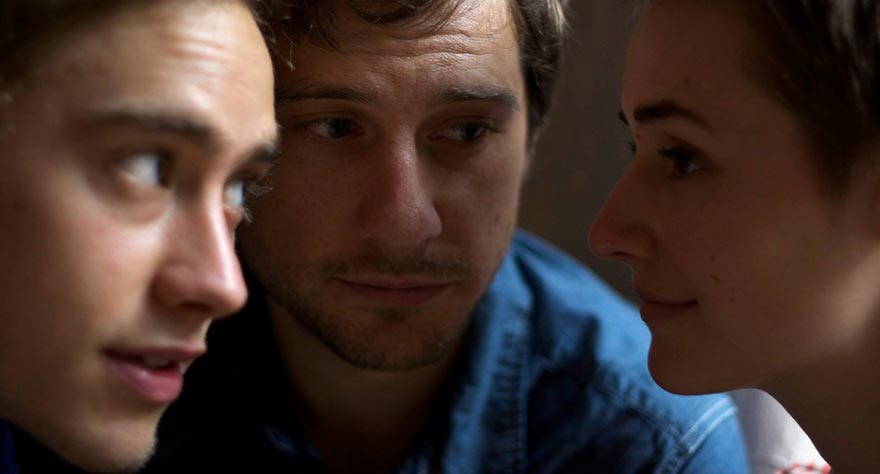
Eccentricity abounds in this tale of three outliers, but all it produces is boredom.

Eccentricity abounds in this tale of three outliers, but all it produces is boredom.
Movies are sometimes easiest to explain in terms of personality. You have your strong, silent types. Your deep and profound types. Your clever and witty types. And of course, unfortunately, the excruciatingly socially awkward types. If Funny Bunny were a person they’d be that guy you avoid desperately at parties. They’d be the person you’d be incredibly tempted to be pulled into an argument with, but know that it’s a fruitless endeavor. Funny Bunny is that person who prides themselves on being as idiosyncratic as possible while simultaneously believing they stand for deep and moral issues. Funny Bunny thinks it’s both complex and interesting. Spoiler alert: it’s neither.
Alison Bagnall now has three films under her directorial belt with Funny Bunny, and having written all three herself—not to mention a fourth, her screenwriting debut Buffalo ’66—it’s easy to decipher her preferred storytelling technique. Which is to create the most unusual people possible, throw them together, add a dash of drama and see what happens. It may boil down to how much weird you can personally handle, or finding bits and pieces of these strange characters to identify with, but, at least in the case of Funny Bunny, it all forms a rather frustrating, incomplete, and just plain gawky viewing experience.
The film begins with quirky character #1, Gene (Kentucker Audley), a divorcee and door-to-door activist raising awareness of the childhood obesity epidemic. During his daily crusading he comes to the house/mini-mansion of quirky character #2, Titty (Olly Alexander), who invites Gene in, runs away giggling and then awkwardly invites him to a sleepover. Gene has enough sense to find that strange, but when his ex-wife and her new man kick Gene out of their house for good, Gene decides to take Titty up on that sleepover offer. Titty is happy to take him in with nary a word about being complete strangers to one another. Titty shows Gene his computer where a girl in a wig, holding a bunny, cries into the camera that she doesn’t have the funds to cover medical expenses for her poor rabbit. Titty eagerly pulls out his credit card and types in the numbers. The girl perks up, thanking him over and over.
Turns out Titty is a trust fund kid who sued his parents and now lives alone, emotionally stunted and harboring some blatant mommy-issues. The girl on the computer screen is quirky character #3, Ginger (Joslyn Jensen), an animal rights activist who spends quite a bit of time in front of her online audience. Titty has developed quite the crush on Ginger and when he tells Gene about his feelings they decide the only logical thing to do is go see her. The two of them jump into Gene’s beat up old van the next day, buy Ginger a new bike, and show up at her back door bright-eyed and eager to make friends. She threatens them with a knife, declaring how creepy their actions are. It’s probably the most true-to-life reaction of the entire film.
Soon enough she comes around and invites the two of them to camp out in her backyard. She introduces them to the animal rights activist she follows and Gene and Titty are privy to a plan to set pigs free from a local farm in protest—though before that a member of the activist group did oddly offer to murder a toddler in the name of the cause. Afterward, Titty, Gene, and Ginger get drunk together and Ginger dances for them in what is a painfully long and puzzling scene.
From here out the script tries to develop some sort of love triangle between Titty, Gene, and Ginger. Each guy gets some alone time with Ginger, and each time she portrays intense signs of trauma and possible former physical abuse when she rejects their physical advances. The film seems as though it may pick up speed when the pig-freeing caper goes wrong for one of the group, but it figures itself out easily enough and the film ends almost without notice.
Bagnall makes some interesting artistic decisions with Funny Bunny, choosing to linger quite long on her subjects. She seems to pride herself on what most would consider painfully extensive scenes of emotional reactions. With so little backstory and such eccentric characteristics defining these characters, it’s almost impossible to understand the depth of these emotional reactions and feel any sympathy. Combined with the in-and-out of focus panning of the camera lens, dark lighting, and lack of music the film is mostly baffling with hardly much to commend it. Jensen is put on the line most, acting Ginger’s passionate and troubled outbursts for extended periods and maintaining the most credibility of these three excessively strange characters.
It isn’t necessarily Bagnall’s attraction to outliers and weirdos in her stories that ultimately hinders Funny Bunny, it’s the alienation that occurs when viewers are asked to empathize and care about the emotional bursts of these strange people simply because they are dramatic. The people of this film may be outlandish, but its plot is so thin that the overall effect is distinctly dull. Somehow, I think even animal rights activists, rich teenagers, and childhood obesity advocates would balk at the proceedings of Funny Bunny, which makes one wonder who out there is this film intended for?